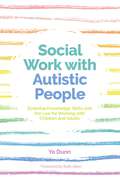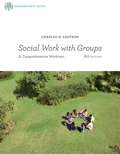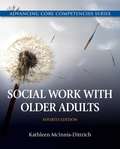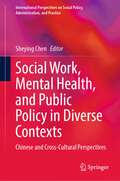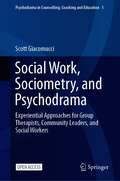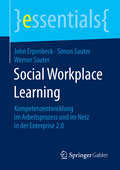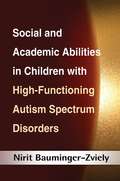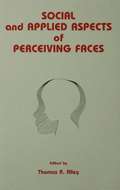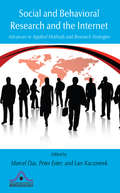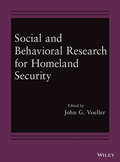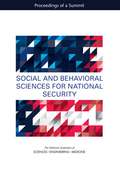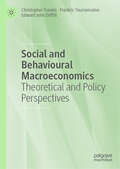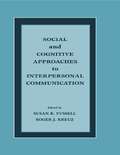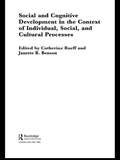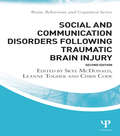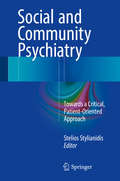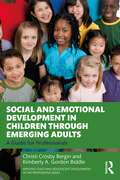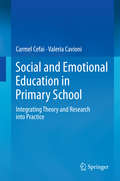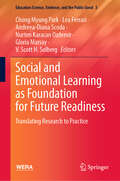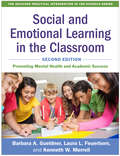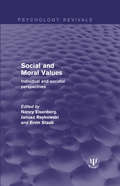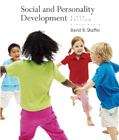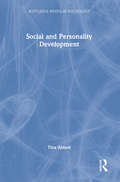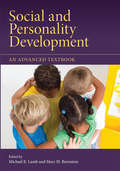- Table View
- List View
Social Work with Autistic People: Essential Knowledge, Skills and the Law for Working with Children and Adults
by Yo DunnThis book will help social workers and practitioners to find achievable solutions to support autistic people - including those with complex needs - to live fulfilling lives in their communities. Far too many autistic people are currently in inappropriate institutional placements, putting their basic human rights at risk and experiencing a poor quality of life. Good quality support for autistic people is achievable, even in a social care system under pressure. This book will help practitioners to develop high quality community support to facilitate discharges and prevent admissions, by providing them with effective, practical strategies to communicate with and more effectively support autistic people right across the spectrum. Common assumptions and beliefs are challenged, including the idea that 'behaviours' are an inevitable part of autism, and practical approaches are offered to promote autonomy, respect for human rights and empathy with autistic perspectives as a basis for preventing distressed behaviour. This will enable practitioners to support and empower all autistic people to achieve a good quality of life in their communities.
Social Work with Groups: A Comprehensive Worktext (8th edition)
by Charles H. ZastrowUsing a plentiful selection of skill-building and self-evaluation exercises, author Charles Zastrow's comprehensive, workbook-style text promotes his philosophy that you can learn group leadership skills best by practicing them in class. In this eighth edition of SOCIAL WORK WITH GROUPS: A COMPREHENSIVE WORKBOOK, Zastrow discusses topics central to a successful understanding of group leadership: stages of groups, group dynamics, verbal and nonverbal communication, types of groups, and diversity in groups. When you participate in groups, the classroom becomes a "lab" where you can experience what it's like to work in and lead the many kinds of groups the author discusses.
Social Work with Older Adults: A Biopsychosocial Approach to Assessment and Intervention (Fourth Edition)
by Kathleen McInnis-DittrichThe fourth edition of Social Work with Older Adults provides a comprehensive treatment of a strengths-based approach to the major areas of social work with older adults. The text examines the basics of biopsychosocial functioning and the design of interventions to treat a wide variety of challenges facing older adults. This updated edition includes content on abuse and neglect of older adults, drug and alcohol abuse and the social worker’s role in dying, bereavement, and advance directives.
Social Work, Mental Health, and Public Policy in Diverse Contexts: Chinese and Cross-Cultural Perspectives (International Perspectives on Social Policy, Administration, and Practice)
by Sheying ChenThe discipline of social policy, oftentimes deemed a part of social work as a profession, was born in the West. Unlike social policy that started with the post-war idea of a welfare state in the mid-20th century, social work traces its roots to individual casework pioneered by the Charity Organization Society (COS), early social administration including state-wide poverty relief (an advocacy effort of the COS but with deep roots in the English Poor Laws of the 17th century), and social action emphasizing political activities to improve social conditions (originating from the Settlement House Movement which began in the 1880s).The development of social work is historically intertwined with that of public welfare, philanthropy, and charity and is an inherently international subject. This conception is broader than “international social work” as a discrete field of professional practice, which crosses geopolitical borders and all levels of social and economic organizations with a focus on development. However, each nation has a story of its own in terms of professionalization of social work in the evolution of public welfare and philanthropic/charitable undertaking within its particular economic, political, social, and cultural settings. A wide-ranging and in-depth study of various (especially non-Western) country cases is essential to an adequate, comprehensive understanding of the social work profession, which is also a basic requirement of its value of diversity.China is undoubtedly an important case with the largest population on earth. It’s also unique in view of so-called Chinese characteristics which are sometimes fundamentally different from other (particularly Western) societies. It’s even intriguing given the country’s lengthy, complex history and its recent, rapid rise to a global superpower with a claim of national goals and core values that seem to be rather considerable to social work as a helping profession. Therefore, any significant lessons learned from the Chinese experiences would help with a better international understanding and further advancement of social work and public welfare at a global scale.
Social Work, Sociometry, and Psychodrama: Experiential Approaches for Group Therapists, Community Leaders, and Social Workers (Psychodrama in Counselling, Coaching and Education #1)
by Scott GiacomucciThis open access book outlines the intersections between social work and the methods of sociometry and psychodrama. Different sections offer essential practice wisdom for both trauma-focused and trauma-informed experiential work for individuals, groups, organizations, and communities. This text enriches the understanding of various action-based approaches and highlights how to enliven social work practice. The chapters include clinical vignettes and examples of structured sociometric prompts with diverse populations, topics, and social work settings to enhance the understanding of group practice, individual practice, and community practice. It provides social workers and other professionals with dynamic tools to improve assessment, intervention, activism, and leadership. Strength-based practical tools are offered to readers, along with guidance for theoretical conceptualizations. This integrative book is an essential read for students, practitioners, leaders, and scholars within the fields of social work, psychodrama, the creative art therapies, group therapy, community organizing, and social activism.
Social Workplace Learning: Kompetenzentwicklung im Arbeitsprozess und im Netz in der Enterprise 2.0 (essentials)
by John Erpenbeck Werner Sauter Simon SauterDie Autoren analysieren, wie sich in der Welt der Enterprise 2. 0 und einer vernetzten Privat- und Arbeitswelt die Anforderungen an die Lernsysteme grundlegend verändern. Lernen und Arbeiten wachsen dabei zusammen. Das Essential erläutert praxiserprobte Lösungskonzeptionen für diesen Veränderungsprozess, um innovative Kompetenzentwicklungssysteme mit Blended Learning in Verbindung mit projektorientiertem Social Learning zu konzipieren, umzusetzen und zu implementieren. Auf diese Weise können Unternehmen eine Kultur kollaborativen Arbeitens und Lernens initiieren, die schrittweise zum Lernen im Prozess der Arbeit führt.
Social and Academic Abilities in Children with High-Functioning Autism Spectrum Disorders
by Nirit Bauminger-ZvielyA uniquely comprehensive resource for practitioners, this research-based book addresses both the social-emotional and cognitive-academic challenges faced by children and adolescents with high-functioning autism spectrum disorders (HFASD). The author traces these kids' developmental trajectories and explores their distinct combination of strengths and needs. Effective school-based interventions for overcoming the social isolation and learning difficulties often associated with HFASD are reviewed in depth. Appendices include concise descriptions of more than 50 relevant assessment tools, plus a detailed, practical outline of the author's empirically supported social intervention model. E-book purchasers can download and print the tables from the Appendices at the companion Web page.
Social and Applied Aspects of Perceiving Faces
by Thomas R. AlleyThis interdisciplinary overview integrates a variety of perspectives on the process and interpretation of faces as a major source of verbal and nonverbal communication. Written by authors from social, experimental, and cognitive psychology as well as from the dental sciences, Social and Applied Aspects of Perceiving Faces covers topics including normal variation in facial appearance and facial anomalies.
Social and Behavioral Research and the Internet: Advances in Applied Methods and Research Strategies (European Association of Methodology Series)
by Marcel Das, Peter Ester and Lars KaczmirekHighlighting the progress made by researchers in using Web-based surveys for data collection, this timely volume summarizes the experiences of leading behavioral and social scientists from Europe and the US who collected data using the Internet. Some chapters present theory, methodology, design, and implementation, while others focus on best practice examples and/or issues such as data quality and understanding paradata. A number of contributors applied innovative Web-based research methods to the LISS panel of CentERdata collected from over 5,000 Dutch households. Their findings are presented in the book. Some of the data is available on the book website. The book addresses practical issues such as data quality, how to reach difficult target groups, how to design a survey to maximize response, and ethical issues that need to be considered. Innovative applications such as the use of biomarkers and eye-tracking techniques are also explored. Part 1 provides an overview of Internet survey research including its methodologies, strengths, challenges, and best practices. Innovative ways to minimize sources of error are provided along with a review of mixed-mode designs, how to design a scientifically sound longitudinal panel and avoid sampling problems, and address ethical requirements in Web surveys. Part 2 focuses on advanced applications including the impact of visual design on the interpretability of survey questions, the impact survey usability has on respondents’ answers, design features that increase interaction, and how Internet surveys can be effectively used to study sensitive issues. Part 3 addresses data quality, sample selection, measurement and non-response error, and new applications for collecting online data. The issue of underrepresentation of certain groups in Internet research and the measures most effective at reducing it are also addressed. The book concludes with a discussion of the importance of paradata and the Web data collection process in general, followed by chapters with innovative experiments using eye-tracking techniques and biomarker data. This practical book appeals to practitioners from market survey research institutes and researchers in disciplines such as psychology, education, sociology, political science, health studies, marketing, economics, and business who use the Internet for data collection, but is also an ideal supplement for graduate and/or upper level undergraduate courses on (Internet) research methods and/or data collection taught in these fields.
Social and Behavioral Research for Homeland Security
by John G. VoellerSocial and Behavioral Research for Homeland Security features articles from the Wiley Handbook of Science and Technology for Homeland Security covering social and psychological aspects of terrorism and counterterrorism efforts from different perspectives. First, it examines the roots of terrorism; second, it explores the consequences of terrorism; then communication, training, and learning development of responders and the public in situations of terror attacks, are discussed.
Social and Behavioral Sciences for National Security: Proceedings of a Summit
by Engineering Medicine National Academies of SciencesIn the coming years, complex domestic and international environments and challenges to national security will continue. Intelligence analysts and the intelligence community will need access to the appropriate tools and developing knowledge about threats to national security in order to provide the best information to policy makers. Research and knowledge from the social and behavioral sciences (SBS) can help inform the work of intelligence analysis; however, in the past, bringing important findings from research to bear on the day-to-day work of intelligence analysis has been difficult. In order to understand how knowledge from science can be directed and applied to help the intelligence community fulfill its critical responsibilities, the National Academies of Sciences, Engineering, and Medicine will undertake a 2-year survey of the social and behavioral sciences. To launch this discussion, a summit designed to highlight cutting-edge research and identify future directions for research in a few areas of the social and behavioral sciences was held in October 2016. This publication summarizes the presentations and discussions from the summit.
Social and Behavioural Macroeconomics: Theoretical and Policy Perspectives
by Christopher Tsoukis Frédéric Tournemaine Edward John DriffillDespite significant theoretical advances in social and behavioural macroeconomics, little has been done to synthesise the disparate developments in these fields and point the way forward to future research directions and policy implications. This book reviews, unifies and extends diverse strands of thinking and shows how these theories can be used to improve macroeconomic modelling for policy development in a range of spheres. The book explores how the most empirically relevant socio-behavioural traits can widen the scope of macroeconomics to fruitfully address new issues and challenges, such as rising inequality, the change in the functional distribution of income (labour and capital shares), and a further understanding of the government spending multiplier. Chapters also address more traditional topics such as macroeconomic policy effectiveness, growth, saving and labour supply. Other, more open-ended themes of the book include whether the concept of individual rationality should be complemented by collective rationality; whether socio-behavioural traits underlie socially inefficient outcomes such as tragedies-of-the-commons, rat races, financial crises and global warming; and whether such traits can provide new foundations for (New) Keynesian macroeconomics. This book will be essential reading for advanced researchers and students working in macroeconomics and other social sciences, including psychology and politics, as well as those working on the theoretical end of public policy.
Social and Civic Competencies Against Radicalization in Schools
by Marcin Sklad Mona Irrmischer Eri Park Inge Versteegt Jantine WignandThis book discusses a range of interventions that can be implemented in schools to prevent radicalization and violent extremism. The book advocates for primary prevention by strengthening social and citizenship competences of youth. It combines perspectives of citizenship education, school psychology, positive psychology, peace psychology and social-emotional learning to highlight the spectrum of approaches that practitioners can consider adopting or advocating for. Mechanisms of radicalization the approaches may relate to are also discussed making it useful not only for practitioners and policy makers developing and implementing preventive interventions at schools, but also for academics studying radicalization and students of education, youth work and educational psychology. The authors discuss relevant concepts such as identity development, perspective taking, political self-efficacy, citizenship competences and youth empowerment, mindfulness and self-regulation.
Social and Cognitive Approaches to Interpersonal Communication
by Roger J. Kreuz Susan R. FussellHistorically, the social aspects of language use have been considered the domain of social psychology, while the underlying psycholinguistic mechanisms have been the purview of cognitive psychology. Recently, it has become increasingly clear that these two dimensions are highly interrelated: cognitive mechanisms underlying speech production and comprehension interact with social psychological factors, such as beliefs about one's interlocutors and politeness norms, and with the dynamics of the conversation itself, to produce shared meaning. This realization has led to an exciting body of research integrating the social and cognitive dimensions which has greatly increased our understanding of human language use. Each chapter in this volume demonstrates how the theoretical approaches and research methods of social and cognitive psychology can be successfully interwoven to provide insight into one or more fundamental questions about the process of interpersonal communication. The topics under investigation include the nature and role of speaker intentions in the communicative process, the production and comprehension of indirect speech and figurative language, perspective-taking and conversational collaboration, and the relationships between language, cognition, culture, and social interaction. The book will be of interest to all those who study interpersonal language use: social and cognitive psychologists, theoretical and applied linguists, and communication researchers.
Social and Cognitive Development in the Context of Individual, Social, and Cultural Processes (Routledge International Library Of Psychology Ser. #No.2)
by Catherine Raeff Janette B. BensonSeveral recent analyses have focused on how social and cultural factors shape development, but less well understood are the individual constructive processes involved in this interplay. This volume showcases varied theoretical and empirical approaches to how individual, social and cultural factors shape development, and suggests new directions for future scholarship.
Social and Communication Disorders Following Traumatic Brain Injury (Brain, Behaviour and Cognition)
by Leanne Togher Chris Code Skye McDonaldTraumatic brain injury (TBI) can seriously disrupt the social and communication skills that are basic requirements for everyday life. It is the loss of these interpersonal skills that can be the most devastating for people with TBI and their families. Although there are many books that focus upon TBI, none focus on communication and communication skills specifically. This book fills this important gap in the literature and provides information ranging from a broad overview of the nature of pathology following TBI and its effects on cognition and behaviour, through to the latest evidence about ways to assess and treat social and communication disorders. Much has changed in the field of communication disorders and TBI since the first edition of this book was published in 1999. There have been advances in neuroimaging, providing more accurate understanding of how the brain is damaged in TBI and also insights into its repair. There has been a burgeoning interest in social cognition, and advances in how communication is conceptualized, with a particular focus on the role of how context facilitates or impedes communicative ability. Most importantly, much has changed in the arena of rehabilitation. There is now a growing evidence base of treatments aimed at improving communication problems following TBI, new resources for accessing this information and renewed interest in different kinds of methods for demonstrating treatment effects. Bringing together a range of expert international researchers interested in understanding the nature and treatment of TBI this book covers topics from understanding how the brain damage occurs, how it affects social and communication skills and how these problems might be treated. As such it will be of great interest to clinicians, postgraduate and undergraduate students and researchers in neuropsychology, speech and language pathology.
Social and Community Psychiatry
by Stelios StylianidisThis book presents the basic theoretical and historical concepts and it describes current perspectives and data, focusing on good practices in community psychiatry in Greece and in other parts of Europe. Concepts such as the biopsychosocial model, psychiatric reform, psychosocial rehabilitation and the recovery model, as well as new case management models are approached from a critical, anthropocentric perspective. The current socioeconomic crisis in Europe brings with it new realities in mental health systems. New forms of social suffering are forcing the psychiatric community to re-examine what is considered normal. In order to respond to the complexity of the newly emerging needs, social and community psychiatry has been compelled to broaden the objectives of intervention and research alike, developing new and dynamic relations with complementary scientific fields such as social anthropology, psychoanalysis and microeconomics. The present work is the result of collaboration between professionals from across these different fields.
Social and Emotional Development in Children through Emerging Adults: A Guide for Professionals (Applying Child and Adolescent Development in the Professions Series)
by Christi Crosby Bergin Kimberly A. Gordon BiddleThis concise guide offers an introduction to how children and young people develop social and emotional competence, and how they display appropriate social behavior and emotional expression at different ages.Explaining the role of adults in a range of contexts and settings, this volume offers strategies for supporting competence and highlights key topics, such as attachment, prosocial behavior, social perspective taking, ethnic identity, social and emotional learning, gender identity, parenting styles, and much more. Moving through the different ages of childhood to emerging adulthood, the authors detail social and emotional development and the development of the self. They also offer strategies to foster social–emotional competence through these different ages.Social and Emotional Development in Children through Emerging Adults is designed for students and professionals in psychological, educational, health and social work settings who want to support and nurture children and young people to ensure their needs are met.
Social and Emotional Education in Primary School
by Carmel Cefai Valeria CavioniThis book synthesizes concepts, findings, and best practices for a complete guide to planning, implementing, and evaluating social and emotional education (SEE) programs. Emphasizing "caught" as well as taught lessons, it offers a whole-school framework for SEE, with content, rationales, assessment tools, and age-appropriate strategies. Interventions are also included for use across subjects, to engage learners and assist students with behavioral and emotional difficulties. And the lessons travel beyond the classroom, involving the whole school, families and communities. Key areas of coverage include: How SEE can be taught and assessed as a core competence. Classroom and whole school frameworks to enhance SEE. Examples of targeted interventions for at-risk students. Techniques for enlisting parents and communities in supporting SEE. A complete online set of SEE class and homework activities. Social and Emotional Education in Primary School is an essential resource for scientist-practitioners, educators, and other professionals as well as researchers and graduate students in special and general education, child and school psychology, educational psychology, social work, positive psychology, and family-related fields.
Social and Emotional Learning as Foundation for Future Readiness: Translating Research to Practice (Education Science, Evidence, and the Public Good #3)
by V. Scott H. Solberg Chong Myung Park Lea Ferrari Andreea-Diana Scoda Nurten Karacan Ozdemir Gloria MarsayThe book offers a global perspective on social and emotional learning skills (SEL) by summarizing findings from a collaborative multi-national and cross-cultural study of educator perceptions regarding the nature and value of SEL skills conducted by career development researchers from 19 countries. In addition to promoting success in education, SEL skills serve as the “durable,” human skills that support success in the world of work. The chapters explore research from three key regions: the Global South, Asia, and the Global North. Alongside comparative analyses of SEL, the book highlights strategies for designing culturally responsive interventions to develop SEL and future-readiness skills. Each region provides tailored recommendations for implementing SEL and career development programs and services. This collaborative research effort offers a unique opportunity to reexamine assumptions underpinning career development theory and practice. It presents a transformative research model that conceptualizes SEL skills policies and practices that are responsive to the diverse sociopolitical contexts and cultural values found in different regions around the world.
Social and Emotional Learning in the Classroom: Promoting Mental Health and Academic Success (The Guilford Practical Intervention in the Schools Series)
by Kenneth W. Merrell Barbara A. Gueldner Laura L. FeuerbornThis trusted resource--now in a thoroughly updated second edition reflecting the tremendous growth of the field--provides a best-practice guide to planning and implementing social and emotional learning (SEL) in K–12 classrooms and schools. The authors present a roadmap to help practitioners choose exemplary programs and strategies, integrate SEL with academics and mental health interventions, create culturally affirming programming for diverse students, use assessment to guide data-based decision making, and support educator SEL. In a convenient large-size format, the volume includes illustrative vignettes and 24 reproducible worksheets and other practical tools. Purchasers get access to a Web page where they can download and print the reproducible materials. New to This Edition *Chapter on educators&’ social and emotional competence and teacher wellness. *Expanded coverage of implementation and systems issues, strategies for weaving SEL into the school day, applying SEL within a multi-tiered system of support, and professional development. *Numerous new and revised worksheets--now downloadable--including new educator reflection activities in each chapter. *Timely topics and themes infused throughout--such as culturally responsive and trauma-informed practices, teacher–family–community partnerships, and relationships as a foundation to SEL success--plus updated SEL resources. This book is in The Guilford Practical Intervention in the Schools Series, edited by Sandra M. Chafouleas.
Social and Moral Values: Individual and Societal Perspectives (Psychology Revivals)
by Nancy Eisenberg Ervin Staub Janusz ReykowskiOriginally published in 1989, this joint venture of American and Polish psychologists provides an international perspective on the psychological factors that make people attend to the well-being of others and of society. The individual sections focus on: theoretical perspectives in the nature of values; the development of positive values; the place of values in various types of decisions; the regulation of behaviors through values and the relation of values to behavioral outcomes; and sociopolitical, socioeconomic, and historical perspectives on values.
Social and Personality Development (6th Edition)
by David R. ShafferThe 6th edition of Social and Personality Development features clearly written, current coverage of social and personality development that aids students in discovering the causes, processes, and complexities that underlie developmental change.
Social and Personality Development (Routledge Modular Psychology Ser.)
by Tina AbbottSocial and Personality Development looks at the processes by which we come to be who we are. It covers a range of topics central to personality and developmental psychology. The book is arranged in three sections, the first covering the main theories of personality, the second describing the development of gender and the third focusing on adolescence. It is suitable for the AQA-A A2 Level examination, but will also be of interest to those studying education, nursing and other related disciplines.
Social and Personality Development: An Advanced Textbook
by Marc H. Bornstein Michael E. LambThis new text contains parts of Bornstein and Lamb’s Developmental Science, 6th edition, along with new introductory material, providing a cutting edge and comprehensive overview of social and personality development. Each of the world-renowned contributors masterfully introduces the history and systems, methodologies, and measurement and analytic techniques used to understand the area of human development under review. The relevance of the field is illustrated through engaging applications. Each chapter reflects the current state of knowledge and features an introduction, an overview of the field, a chapter summary, and numerous classical and contemporary references. As a whole, this highly anticipated text illuminates substantive phenomena in social and personality developmental science and its relevance to everyday life. Students and instructors will appreciate the book’s online resources. For each chapter, the website features: chapter outlines; a student reading guide; a glossary of key terms and concepts; and suggested readings with hotlinks to journal articles. Only instructors are granted access to the test bank with multiple-choice, short-answer, and essay questions; PowerPoints with all of the text’s figures and tables; and suggestions for classroom discussion/assignments. The book opens with an introduction to social and personality development as well as an overview of developmental science in general—its history and theory, the cultural orientation to thinking about human development, and the manner in which empirical research is designed, conducted, and analyzed. Part 2 examines personality and social development within the context of the various relationships and situations in which developing individuals function and by which they are shaped. The book concludes with an engaging look at applied developmental psychology in action through a current examination of children and the law. Ways in which developmental thinking and research affect and are affected by practice and social policy are emphasized. Intended for advanced undergraduate and/or graduate level courses on social and personality development taught in departments of psychology, human development, and education, researchers in these areas will also appreciate this book’s cutting-edge coverage.
